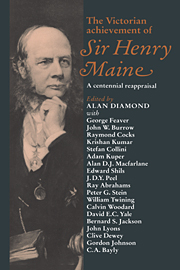Book contents
- Frontmatter
- Contents
- Notes on contributors
- Foreword by Sir John Lyons
- Introduction
- 1 The Victorian values of Sir Henry Maine
- PART 1 MAINE AND THE IDEA OF PROGRESS
- PART 2 MAINE AND THE SOCIAL SCIENCES
- 6 The rise and fall of Maine's patriarchal society
- 7 Some contributions of Maine to history and anthropology
- 8 Henry Sumner Maine in the tradition of the analysis of society
- 9 Maine as an ancestor of the social sciences
- 10 Ancient Law and modern field work
- PART 3 MAINE ON LAW, LEGAL CHANGE AND LEGAL EDUCATION
- PART 4 MAINE AND INDIA
- Appendix: the conference programme
- Bibliography
- Index
7 - Some contributions of Maine to history and anthropology
Published online by Cambridge University Press: 04 September 2009
- Frontmatter
- Contents
- Notes on contributors
- Foreword by Sir John Lyons
- Introduction
- 1 The Victorian values of Sir Henry Maine
- PART 1 MAINE AND THE IDEA OF PROGRESS
- PART 2 MAINE AND THE SOCIAL SCIENCES
- 6 The rise and fall of Maine's patriarchal society
- 7 Some contributions of Maine to history and anthropology
- 8 Henry Sumner Maine in the tradition of the analysis of society
- 9 Maine as an ancestor of the social sciences
- 10 Ancient Law and modern field work
- PART 3 MAINE ON LAW, LEGAL CHANGE AND LEGAL EDUCATION
- PART 4 MAINE AND INDIA
- Appendix: the conference programme
- Bibliography
- Index
Summary
An intelligent undergraduate could undoubtedly make a strong case for dismissing Maine. Having read through subsequent assessments of his work, he would list Maine's supposed achievements and then show how each was deeply flawed. Such a critic would point to the supposed ‘revolutionary’ method, comparative and historical, and show how it was deeply imbued with a form of patronizing Victorian evolutionism which is now both morally and intellectually repugnant. The vaunted width and depth of scholarship would crumble before allegations of inaccuracy and over-dependence on an erring memory. The father of kinship studies in anthropology would be shown to have set up a false theory of universal patriarchal origins which was soon refuted. The great insight, of the movement, of progressive societies from status to contract, would be shown not to be true even of all ‘progressive’ societies, and in any case was already anticipated by many other Enlightenment thinkers, as well as by Marx. The theories concerning the religious basis of law turn out to be a myth, and the theory of the ways in which legal change occurs, to be inappropriate to the common law. The central thesis concerning the original communal nature of property in Indian and Germanic villages was soon shown to be much too sweeping a generalization. The view that simpler societies rest their associations on kinship, and only later move to non-kinship, or territorial, bonds was soon disputed.
- Type
- Chapter
- Information
- The Victorian Achievement of Sir Henry MaineA Centennial Reappraisal, pp. 111 - 142Publisher: Cambridge University PressPrint publication year: 1991
- 2
- Cited by

